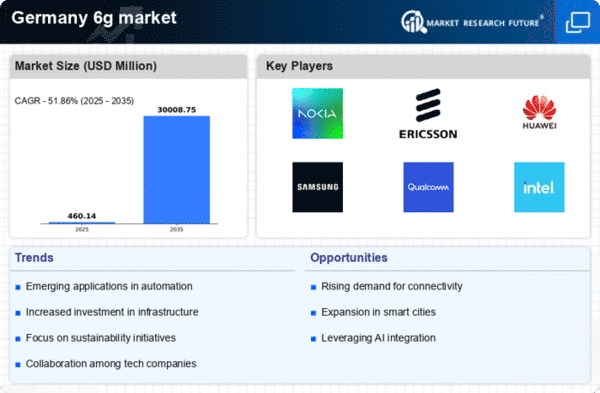Government Initiatives and Funding
Government initiatives play a pivotal role in shaping the 6g market in Germany. The federal government has launched several programs aimed at fostering innovation and supporting the development of advanced communication technologies. For instance, the Digital Strategy 2025 outlines plans to enhance digital infrastructure and promote research in next-generation networks. Additionally, funding opportunities for startups and research institutions are becoming increasingly available, with an estimated €500 million earmarked for 6g-related projects. These initiatives not only encourage private sector investment but also facilitate collaboration between various stakeholders, including universities, research centers, and industry leaders. As a result, the supportive regulatory environment is likely to accelerate advancements in the 6g market.
Emerging Applications and Use Cases
The emergence of new applications and use cases is a critical driver of the 6g market in Germany. As industries explore the potential of 6g technologies, innovative applications are expected to arise in sectors such as healthcare, transportation, and entertainment. For example, the integration of augmented reality (AR) and virtual reality (VR) in training and education is anticipated to gain traction, requiring ultra-low latency and high bandwidth. Furthermore, advancements in autonomous vehicles will necessitate robust communication networks to ensure safety and efficiency. The potential for smart manufacturing and Industry 4.0 applications also presents opportunities for growth. As these use cases develop, they will likely create a demand for 6g solutions, further propelling the 6g market.
Competitive Landscape and Market Dynamics
The competitive landscape of the 6g market in Germany is evolving rapidly, driven by the presence of established telecommunications companies and emerging startups. Major players are investing heavily in research and development to maintain their competitive edge, with some companies reportedly allocating up to 15% of their annual revenue to 6g initiatives. This competitive environment fosters innovation and accelerates the development of new technologies. Additionally, partnerships and collaborations between industry players are becoming increasingly common, as companies seek to leverage each other's strengths. The dynamic nature of the market is likely to result in a diverse range of offerings, catering to various consumer needs and preferences. As competition intensifies, the 6g market is expected to witness significant advancements and growth.
Increased Demand for High-Speed Connectivity
The demand for high-speed connectivity in Germany is a significant driver of the 6g market. With the proliferation of IoT devices and the growing reliance on cloud-based services, consumers and businesses alike are seeking faster and more reliable internet connections. Recent studies indicate that over 80% of German households are expected to have access to high-speed internet by 2026, creating a robust market for 6g technologies. This demand is further fueled by the increasing adoption of smart city initiatives, which require seamless connectivity for various applications, including traffic management and public safety. As a result, telecommunications companies are likely to invest heavily in 6g infrastructure to meet these evolving consumer needs, thereby accelerating the growth of the 6g market.
Technological Advancements in Telecommunications
The 6g market in Germany is poised for growth due to rapid technological advancements in telecommunications. Innovations in antenna technology, signal processing, and network architecture are expected to enhance connectivity and data transmission speeds. The German government has allocated approximately €1 billion for research initiatives aimed at developing next-generation communication technologies. This investment is likely to stimulate collaboration between academia and industry, fostering an environment conducive to innovation. Furthermore, advancements in artificial intelligence and machine learning are anticipated to optimize network management and resource allocation, thereby improving overall efficiency. As these technologies mature, they will play a crucial role in shaping the 6g market, enabling new applications and services that were previously unattainable.
















